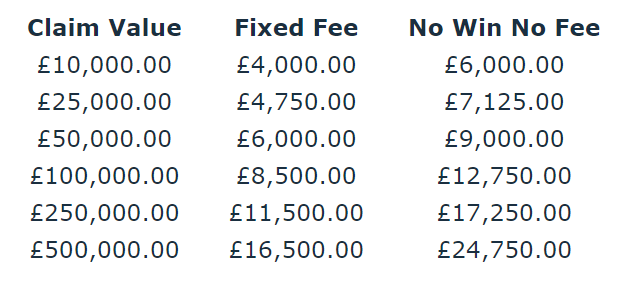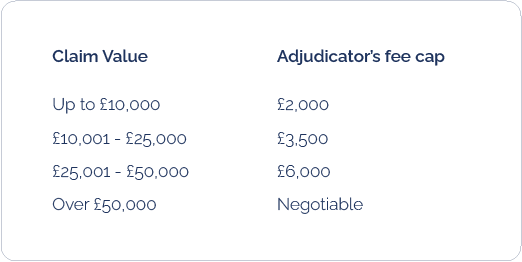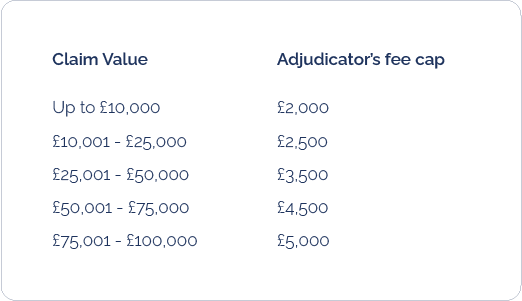Adjudication Costs
Helix Law Fees
Our fees for a smash & grab are £4,000 plus 5% of any sum claimed over £10,000 up to £100,000 and then 2% for any sum above £100,000 – all plus VAT. If you decide to instruct us on a “no win no fee” basis the sum payable is as above plus 50%.
The table below gives examples of how the pricing works:

All plus VAT.
The Adjudicator’s fees
Which adjudication rules you can use and how the fees are calculated will depend on the contract and/or your particular dispute. In some cases the rules will allow for the adjudicator’s fees to be fixed or capped. In other cases you will just have to pay the adjudicator’s fees and expenses on a reasonable cost basis depending on their time and expenditure. If your dispute and adjudication rules qualify for any of the fixed fee or capped fees schemes, you will have more control on costs and risk. Below are some examples of this kind of scheme – you need to check whether your dispute is eligible before embarking on any particular scheme.
The CIC service
The CIC Low Value Disputes Model Adjudication Procedure (CIC LVD MAP) has been established following the publication of the CIC LVD MAP Procedure (1st Edition) published on 1 May 2020. The CIC LVD MAP complies with the Construction Act and applies to disputes where the total amount claimed is £50,000 or less excluding VAT. Where the parties have a dispute where the claim exceeds £50,000, they may also choose to follow this procedure.
The scheme is beneficial in three ways: (i) it provides for a streamlined procedure which is intended to be uncomplicated; (ii) there is a timetable to manage disputes to minimise unnecessary costs; and (iii) there is certainty as to the adjudicator’s fees.
The adjudicator’s fees are laid out in Schedule 1 as follows:

An additional fee of £1,000 plus reasonable travel expenses applies where the Adjudicator is requested to meet with the parties or conduct a site visit.
TeCSA
On 21 June 2019, TeCSA launched their own pilot for the Low Value Disputes (LVD) Adjudication Service for claims for payment of up to £100,000 (excluding VAT and interest). From 1 January 2020, the LVD Adjudication Service is fully part of TeCSA’s Adjudication Service offering.
Similarly to the CIC LVD MAP the TeCSA LVD Adjudication Service is aimed at giving parties who wish to refer disputes to adjudication certainty as to the costs of the adjudicator. A difference from the CIC LVD MAP is that the TeCSA service only limits the fees which the adjudicator can charge and so it is not necessary for the opposing party to agree to the use of the TeCSA service. TeCSA is therefore available to parties provided that no other adjudicator nominating body is specified in the relevant contract.
The values of the amount being claimed and the adjudicator’s fee caps are as follows:

In respect of the TeCSA service, parties will also need to consider whether, the service is appropriate for their dispute. The TeCSA service only applies to claims for a specified amount i.e. a liquidated sum, as between two parties and does not apply to claims where the amount sought has not been quantified e.g. damages or loss and expense to be assessed. The service would also therefore not apply to claims for declarations as to the meaning of contract terms, albeit that it may be necessary under the service when determining a financial claim for the adjudicator to form a view and make a decision on what the contract means.
Please discuss with Helix Law which service is appropriate for your dispute using the contact form below.
Weighing Up The Costs Of Adjudication And The Associated Risks
Construction adjudication was introduced by the government over 20 years ago to provide a swift and cost effective way of resolving construction disputes. It was intended that adjudication could avoid the costs risks and delay that inevitably occur with litigation or arbitration. The aim was to achieve this by a quick procedure which would prevent either party from recovering its legal costs for adjudication in any circumstances. By simplifying and accelerating the procedure it was hoped that parties could proceed without legal advice and without fear of having to pay the bigger party’s legal costs if it failed.
Unfortunately, in the two decades that have followed, construction adjudication has become more technical with parties often using lawyers. As a result adjudicator’s fees, normally paid by the losing party, but often paid by the winning party pending recovery from the losing party, have risen to levels that present a significant risk for any party considering referring a dispute to an adjudicator. Risk and costs are inevitable but for smaller disputes they have become disproportionate to the benefits.
Low value adjudication services have been introduced to address this problem for smaller disputes. This blog outlines how those services operate and how parties can best use them.
Adjudication as cost effective dispute resolution
Statutory adjudication was introduced by the Housing Grants, Construction and Regeneration Act 1996 (the “Construction Act”). It applies to parties to a “construction contract” and provides for a 28-day procedure, although parties can agree to extend this period. The adjudicator’s decision is interim-binding, meaning that it is binding until the dispute is finally determined by legal proceedings, arbitration or by agreement. For this reason, adjudication is often described as ‘pay first, argue later’.
A party must consider a number of things when pursuing a dispute – at the top of those considerations will be: (i) how long the dispute will take to resolve; (ii) chances of success; and (iii) how much it will cost. The objective of adjudication was to promote cash-flow in the construction industry and encourage parties to resolve their disputes at any time. By providing a cost efficient and speedy solution to disputes, adjudication was intended to be an attractive alternative to arbitration or litigation.
Rising complexity of the process
The intentions for adjudication were good. However, the reality is that process has ended up far from where it began. Adjudicator’s fees have risen to a level that prejudice the weaker party.
In terms of the average figures for adjudication, in November 2017 the Adjudication Society produced a paper on Adjudicator’s Fees. The average hourly fee charged by those adjudicators who participated in their research was £210, while the average total fee was £8,878 per adjudication. The costs can therefore be significant and notably these only reflect the adjudicator’s fees, not the costs the parties incur themselves.
Keeping costs low – low value adjudication schemes
The industry has responded to concerns about the increasing complexity and prohibitive costs of adjudication. Two schemes have been introduced which are aimed low value adjudication disputes. Those are:
- Construction Industry Council’s (CIC) low value disputes adjudication appointment service.
- The Technology and Construction Solicitors’ Association (TeCSA) low value dispute adjudication service.
This blog also discusses the Royal Institute of Chartered Surveyors (RICS) Summary Adjudication service which can offer some similar advantages.
The CIC service
The CIC Low Value Disputes Model Adjudication Procedure (CIC LVD MAP) has been established following the publication of the CIC LVD MAP Procedure (1st Edition) published on 1 May 2020. The CIC LVD MAP complies with the Construction Act and applies to disputes where the total amount claimed is £50,000 or less excluding VAT. Where the parties have a dispute where the claim exceeds £50,000, they may also choose to follow this procedure.
The scheme is beneficial in three ways: (i) it provides for a streamlined procedure which is intended to be uncomplicated; (ii) there is a timetable to manage disputes to minimise unnecessary costs; and (iii) there is certainty as to the adjudicator’s fees. The adjudicator’s fees are laid out in Schedule 1 as follows:
Claim value
Up to £10,000
£10,001 – £25,000
£25,001 – £50,000
Over £50,000
Adjudicator’s fees
£2,000
£3,500
£6,000
Negotiable
An additional fee of £1,000 plus reasonable travel expenses applies where the Adjudicator is requested to meet with the parties or conduct a site visit.
In terms of the CIC service, the CIC LVD MAP can be adopted by the parties to a dispute if they have incorporated it into their contract Alternatively, parties may agree to use the procedure on an ad-hoc basis when a dispute arises. The CIC LVD MAP is supported by ten Participating Adjudicator Nominating Bodies:
(i) Centre for Effective Dispute Resolution (CEDR);
(ii) Chartered Institute of Arbitrators (CIArb);
(iii) Chartered Institute of Building (CIOB);
(iv) Construction Industry Council (CIC);
(v) Institution of Civil Engineers (ICE);
(vi) Institution of Engineering & Technology (IET);
(vii) Institution of Mechanical Engineers (IMechE);
(viii) Royal Institute of British Architects (RIBA);
(ix) Royal Institution of Chartered Surveyors (RICS); and
(x) UKANB Limited (UK Adjudicators).
TeCSA
On 21 June 2019, TeCSA launched their own pilot for the Low Value Disputes (LVD) Adjudication Service for claims for payment of up to £100,000 (excluding VAT and interest). From 1 January 2020, the LVD Adjudication Service is fully part of TeCSA’s Adjudication Service offering.
Similarly to the CIC LVD MAP the TeCSA LVD Adjudication Service is aimed at giving parties who wish to refer disputes to adjudication certainty as to the costs of the adjudicator. A difference from the CIC LVD MAP is that the TeCSA service only limits the fees which the adjudicator can charge and so it is not necessary for the opposing party to agree to the use of the TeCSA service. TeCSA is therefore available to parties provided that no other adjudicator nominating body is specified in the relevant contract.
The values of the amount being claimed and the adjudicator’s fee caps are as follows:
Claim value
Up to £10,000
£10,001 – £25,000
£25,001 – £50,000
£50,001 – £75,000
£75,001 – £100,000
Adjudicator’s fee cap
£2,000
£2,500
£3,500
£4,500
£5,000
In respect of the TeCSA service, parties will also need to consider whether, the service is appropriate for their dispute. The TeCSA service only applies to claims for a specified amount i.e. a liquidated sum, as between two parties and does not apply to claims where the amount sought has not been quantified e.g. damages or loss and expense to be assessed. The service would also therefore not apply to claims for declarations as to the meaning of contract terms, albeit that it may be necessary under the service when determining a financial claim for the adjudicator to form a view and make a decision on what the contract means.
RICS – Summary Adjudication
RICS are now offering Summary Adjudication for claims below £20,000. Their aim is to assist those at smaller end of the market who are struggling to access dispute resolution even under the reduced cost LVD MAP process. The service has been specifically set-up in response to difficulties some parties find themselves in during Covid-19 and accessing dispute resolution which is both speedy and cost-effective.
Parties can apply for the nomination of a qualified adjudicator who will be able to deliver a summary decision, with outline reasons only, restricted to one A4 page, within fourteen days of referral. There will be no inspection or site visit involved and the fee will be capped at £1000 + VAT. If either party wants full reasons, they will be able, at their own expense, to ask the adjudicator to produce them, once the summary adjudication has been completed. There is an application fee of £250 + VAT for this type of nomination.
Factors for parties to consider
The TeCSA, CIC and RICS services will provide certainty for parties in terms of the adjudicator’s fees. This reduces at least some of the uncertainty in terms of costs for the adjudication process. However, a number of points are of note from the above:
- A party wishing to refer a matter to adjudication must check whether an adjudicator nominating body is provided for in the relevant contract and act accordingly.
- The key difference between the TeCSA and CIC services is how the two services apply. As is outlined above, the CIC LVD MAP is a separate set of adjudication rules whereas the TeCSA service applies when TeCSA makes an appropriate appointment. The TeCSA service only seeks to limit the fees the adjudicator can charge and consequently it is unnecessary for the responding party to agree to use the service. However, in the case of the CIC LVD MAP, the parties either have to have agreed in their contracts to refer low value disputes under this procedure or reach such an agreement after the dispute has arisen. It is in both parties’ interests to keep costs low; however this does mean the application of the CIC LVD MAP may not apply as smoothly in some cases.
- Nonetheless, this is also the advantage of the CIC LVD MAP. The TeCSA service is limited to adjudicator appointments made by TeCSA. This is to be contrasted with the proposed CIC LVD MAP, which can be used by any appropriate nominating body.
- While both services cap fees for adjudicators and therefore provided increase certainty, there are differences in terms of the level of fees under both services. In particular in respect of disputes between £25,001 – £50,000, for which TeCSA provides for a lower cap.
- In respect of both services, parties will need to consider whether their dispute is appropriate. For example, the TeCSA LVD adjudication service is for liquidated sums and so some disputes will not be appropriate for consideration under the service. Further, both services define the level of a low value dispute differently – TeCSA provides its service for disputes up to £100,000, whereas CIC provides its service for disputes up to £50,000. However, the CIC service does provide for some flexibility on this upper limit for disputes of a higher value.
Getting the most out of adjudication
Adjudication can still be a cost-effective and perhaps most importantly, a speedy solution to a dispute. To ensure that the benefits of adjudication outweigh the risks and the costs, parties should bear the following in mind:
- The proposed CIC LVD MAP includes a boilerplate LVD adjudication clause for parties to include in their contracts. Moving forward, parties should consider whether they wish to include this clause or a similarly worded clause in their contract.
- A point which emerges when reflecting on the services above, is that while the service can cap the fees of the adjudicator there is no similar cap on the parties’ costs. Consequently parties should plan their costs and consider the most proportionate way to conduct their dispute.
- For that reason, parties should be mindful of adhering to the established parameters of adjudication to save unnecessary costs. (i) For example, ensuring that a dispute has ‘crystallised’ to avoid the costs of having to restart an adjudication which has been prematurely commenced. Section 108 of the Construction Act entitles a party to give notice of its intention to refer a dispute to adjudication “at any time”. However, there is no right to adjudicate unless the dispute has crystallised. (ii) Parties should also review the dispute resolution clauses of their respective contracts. Some contracts will provide for a ‘tiered’ approach to dispute resolution, meaning that adjudication must be used before arbitration or litigation can be. This is another common pitfall through which unnecessary costs and time are lost. (iii) A referring party should take care with their notice of adjudication, which defines the scope of the matters to be dealt with by the adjudicator. The referring party must ensure that their referral notice does not go beyond their notice of adjudication, as this would give rise to a jurisdictional challenge. In practice, it is often best to draft these two documents at the same time for this reason.
The LVD schemes have not, and cannot, resolve entirely the problems of rising costs and complexity in adjudication. However, they are a meaningful step in restoring some balance. Parties should give real consideration to using these services as disputes arise and providing for these services in their contracts moving forward.

Request A Call Back
People frequently tell us that we’re approachable and offer great advice.
They also tell us most solicitors are hard to get hold of whereas we’re happy to listen. The reason for this is that we value long term relationships and we’re happy to speak with business people, to invest our time in understanding your business and whatever your concerns are. Only at that point can we understand whether we’re the right people to help you.